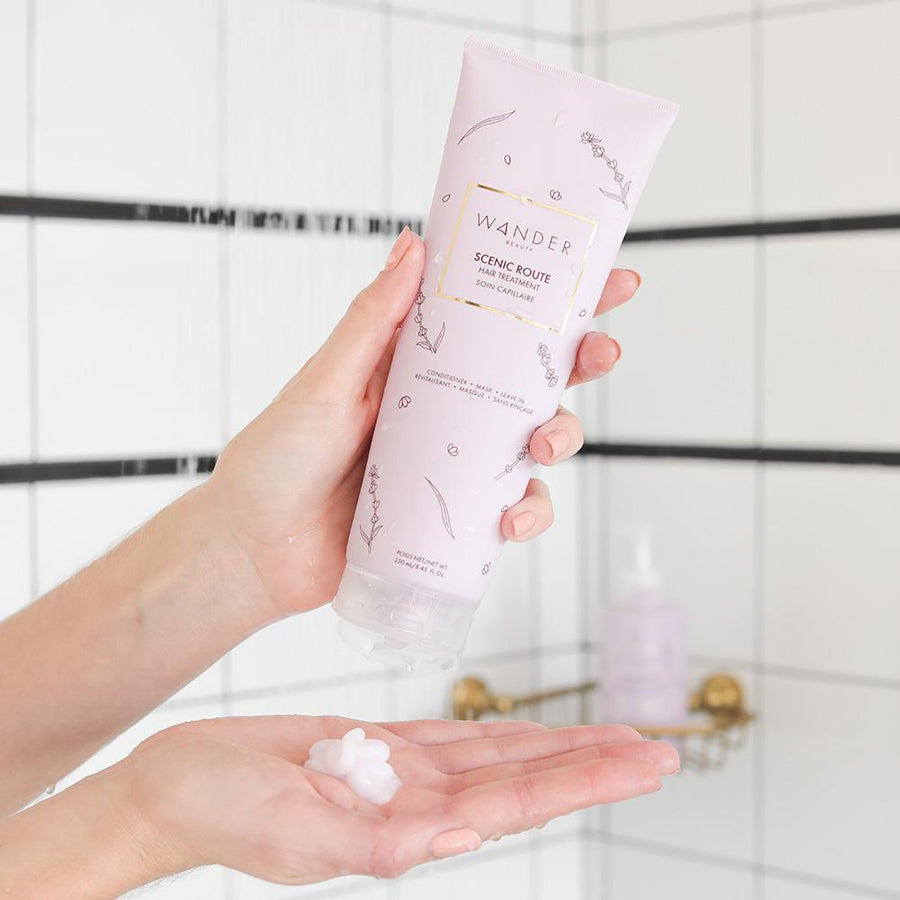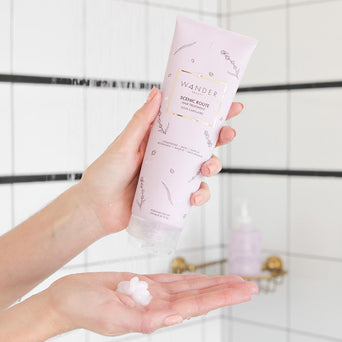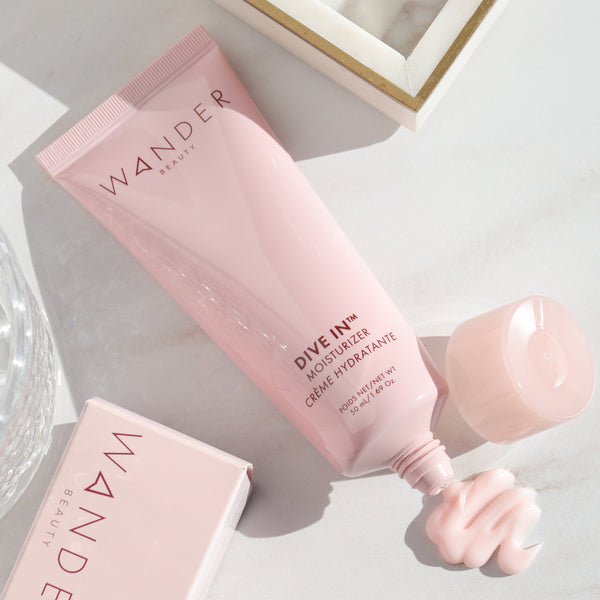How To Get Soft Hair
By Emily Chiang | Jun 21, 2021
Who doesn’t dream of shampoo commercial-worthy hair? If you’ve noticed your locks feel like straw or look dull lately, it’s time to make a change. Just a few simple alterations to your routine can help you achieve the soft, gorgeous hair you desire.
There are several ways that you can combat broken, rough hair to achieve glorious, silky locks you’ll want to show off all summer long. Some of these steps are easier to complete than others, so feel free to pick and choose which you’d like to try.
Remember: it will take a while to rebuild beautiful hair, but it will be worth it. When it comes to a hair care routine, consistency really is key.
Use the Right Products
The products that you use on your hair can make an impact on its overall health, for better or worse. This means that they can help you achieve the silky strands of your dreams, or they can tear your hair down. That’s why using products that support your hair is crucial.
There are some ingredient red flags you should watch out for. These include parabens, sulfates, and silicone. If your hair products contain these ingredients, we suggest switching them out. Here’s why.
Parabens are chemical preservatives that ensure your products don’t grow moldy or become bacteria-ridden. These chemicals are usually inexpensive, effective, and extend the shelf life of hair care or cosmetics. The problem is that there can be unsettling effects on the human body.
Parabens can actually damage your scalp and hair, which means that they’re doing the exact opposite of supporting healthier, stronger hair. In addition, they can destroy your color and even lead to hair loss. Some people have allergies to these chemicals, and contact with them can exacerbate skin conditions or even cause a reaction.
Sulfates are another hair care no-no. Sulfates refer to a group of chemicals that are added to hair care for cleaning purposes. Sulfates may cause scalp irritation and strip your hair of its natural oils which are essential to maintaining hair health.
Finally, you should also avoid silicones in your hair products. Think of these as a raincoat for your hair. They effectively lock out humidity, which will make your hair appear sleek and smooth. Still, silicones should be avoided for several reasons. One is that they can weigh your hair down as they prevent other moisturizing ingredients from reaching the hair shaft. They’re not usually water-soluble, which means build-up over time can be excessive. This gives way to a never-ending cycle of needing to use products with silicone in them.
Skip Daily Shampoos
Our next piece of advice might be somewhat surprising. Your daily shampoos are standing in your way of soft hair because washing it every day is stripping your hair of natural oils. The result will be the opposite of what you’re trying to achieve — dry, brittle hair.
Never Skimp on Conditioner
Using enough conditioner is vital to maintaining your hair’s health. Unlike shampoo, which you can definitely overdo, you can never have too much conditioner. Conditioner plays a role in balancing the pH levels in your hair. It also smooths the cuticle, which helps maintain your hair color as well as the moisture in your hair. The smoother your hair cuticle is, the healthier, shinier, and bouncier it will be. Conditioner is a crucial ingredient to achieving soft hair.
Invest in Hair Masks
If you haven’t used a hair mask already, you’re in for a treat when you do. A hair mask has the same concept as a facial mask except it’s for your hair. Masks were created to help your hair regain moisture, brightness, and even softness. You can make your own or you can invest in a pre-made product designed specifically to soften your hair.
Never Wash with Hot Water
If you’re routinely washing your hair with hot water, you’ll see a big difference when you make the switch to cold water. Hot water is damaging to the hair because it elevates your hair cuticle. This allows moisture to leave your strands more rapidly, resulting in dry, brittle hair that can lose its strength. Hot water can put you at a greater risk of developing dandruff as it dries the skin on your scalp out.
Always Rinse with Cold Water
Cold water doesn’t elevate your hair cuticles as much as hot water does, so if you rinse with cold water, you’re helping your hair retain some of its strength and moisture. The more closed your cuticles are, the smoother your hair will look. Rinsing with cold water also allows your hair to preserve its natural oils, which provide it with a shine.
Limit Heat Tools
Heat is damaging for every hair type, so whether you have pin-straight or curly hair, you should look for ways to minimize the amount of heat exposure your hair gets. Using a product such as a heat protectant can prove helpful, but it doesn’t eliminate the fact that your hair gets damaged by soaring high temperatures.
Staying away from heat tools won’t lead to soft hair immediately because it’s possible that your hair already has damage from all the times that you used straighteners or curlers on it. If you spend enough time away from heat products, however, you’ll notice that the texture of your hair could change for the better.
Boost Your Diet
Another easy way you can get softer hair is by boosting your diet with foods and vitamins that support hair health. By adding these foods into your daily diet, you may notice an improvement in your hair softness.
Omega-3 Fatty Acids
There is plenty of speculation that choosing foods that are rich in Omega-3 fatty acids can make a positive impact on your hair’s health, especially if you’ve suffered from hair loss. Two scientific studies, one in 2015 and one in 2018, helped fuel this.
You can enhance your diet by adding Omega-3 in a variety of ways. One way is by including fish oil into what you’re eating. Omega-3 can also sometimes be found in some plant oils. If you don’t eat anything with Omega-3 in it, you can also choose to take a supplement instead. The best part of adding Omega-3 into your diet is that it supports your overall health, not just your hair.
Iron-Rich Foods
Evidence suggests that iron deficiency can cause hair loss. Therefore, by boosting the amount of iron-rich foods you’re eating, you can be supporting your hair’s health. Every hair follicle is fed by a blood supply in your scalp, so this partially accounts for why iron is so essential.
If your iron levels get too low, you can become anemic. This could prevent your hair follicles from getting the nutrient and oxygen-rich blood that they require to grow and stay healthy. You can get iron by including foods such as clams, eggs, oysters, red meat, spinach, and lentils into your diet.
Biotin-Rich Foods
Vitamin B-7, or biotin, is a vitamin that’s vital to help the body convert food into fuel. Because it is water-soluble, your body requires a regular supply of it to keep functioning correctly. If you have inadequate levels of biotin, you might experience problems related to your nervous system, skin, nails, or hair. It can also have an impact on the immune system.
Some people decide to take biotin supplements, but you can also obtain it from the foods that you eat. Some biotin-rich foods include liver, yeast, egg yolk, avocados, some dairy products, nuts and seeds, salmon, sweet potatoes, and broccoli.
Vitamin C
Lastly, vitamin C can make a positive impact on your hair’s health. It can act as a moisturizer and humectant in some hair products, which means that it can work to ward off dryness that leads to frizzy, brittle strands.
Conclusion
Soft hair is achievable, but only if you invest in the right products and commit to a consistent routine. Show us your luxurious locks @Wander_Beauty!
How To Get Soft Hair

Who doesn’t dream of shampoo commercial-worthy hair? If you’ve noticed your locks feel like straw or look dull lately, it’s time to make a change. Just a few simple alterations to your routine can help you achieve the soft, gorgeous hair you desire.
There are several ways that you can combat broken, rough hair to achieve glorious, silky locks you’ll want to show off all summer long. Some of these steps are easier to complete than others, so feel free to pick and choose which you’d like to try.
Remember: it will take a while to rebuild beautiful hair, but it will be worth it. When it comes to a hair care routine, consistency really is key.
Use the Right Products
The products that you use on your hair can make an impact on its overall health, for better or worse. This means that they can help you achieve the silky strands of your dreams, or they can tear your hair down. That’s why using products that support your hair is crucial.
There are some ingredient red flags you should watch out for. These include parabens, sulfates, and silicone. If your hair products contain these ingredients, we suggest switching them out. Here’s why.
Parabens are chemical preservatives that ensure your products don’t grow moldy or become bacteria-ridden. These chemicals are usually inexpensive, effective, and extend the shelf life of hair care or cosmetics. The problem is that there can be unsettling effects on the human body.
Parabens can actually damage your scalp and hair, which means that they’re doing the exact opposite of supporting healthier, stronger hair. In addition, they can destroy your color and even lead to hair loss. Some people have allergies to these chemicals, and contact with them can exacerbate skin conditions or even cause a reaction.
Sulfates are another hair care no-no. Sulfates refer to a group of chemicals that are added to hair care for cleaning purposes. Sulfates may cause scalp irritation and strip your hair of its natural oils which are essential to maintaining hair health.
Finally, you should also avoid silicones in your hair products. Think of these as a raincoat for your hair. They effectively lock out humidity, which will make your hair appear sleek and smooth. Still, silicones should be avoided for several reasons. One is that they can weigh your hair down as they prevent other moisturizing ingredients from reaching the hair shaft. They’re not usually water-soluble, which means build-up over time can be excessive. This gives way to a never-ending cycle of needing to use products with silicone in them.
Skip Daily Shampoos
Our next piece of advice might be somewhat surprising. Your daily shampoos are standing in your way of soft hair because washing it every day is stripping your hair of natural oils. The result will be the opposite of what you’re trying to achieve — dry, brittle hair.
Never Skimp on Conditioner
Using enough conditioner is vital to maintaining your hair’s health. Unlike shampoo, which you can definitely overdo, you can never have too much conditioner. Conditioner plays a role in balancing the pH levels in your hair. It also smooths the cuticle, which helps maintain your hair color as well as the moisture in your hair. The smoother your hair cuticle is, the healthier, shinier, and bouncier it will be. Conditioner is a crucial ingredient to achieving soft hair.
Invest in Hair Masks
If you haven’t used a hair mask already, you’re in for a treat when you do. A hair mask has the same concept as a facial mask except it’s for your hair. Masks were created to help your hair regain moisture, brightness, and even softness. You can make your own or you can invest in a pre-made product designed specifically to soften your hair.
Never Wash with Hot Water
If you’re routinely washing your hair with hot water, you’ll see a big difference when you make the switch to cold water. Hot water is damaging to the hair because it elevates your hair cuticle. This allows moisture to leave your strands more rapidly, resulting in dry, brittle hair that can lose its strength. Hot water can put you at a greater risk of developing dandruff as it dries the skin on your scalp out.
Always Rinse with Cold Water
Cold water doesn’t elevate your hair cuticles as much as hot water does, so if you rinse with cold water, you’re helping your hair retain some of its strength and moisture. The more closed your cuticles are, the smoother your hair will look. Rinsing with cold water also allows your hair to preserve its natural oils, which provide it with a shine.
Limit Heat Tools
Heat is damaging for every hair type, so whether you have pin-straight or curly hair, you should look for ways to minimize the amount of heat exposure your hair gets. Using a product such as a heat protectant can prove helpful, but it doesn’t eliminate the fact that your hair gets damaged by soaring high temperatures.
Staying away from heat tools won’t lead to soft hair immediately because it’s possible that your hair already has damage from all the times that you used straighteners or curlers on it. If you spend enough time away from heat products, however, you’ll notice that the texture of your hair could change for the better.
Boost Your Diet
Another easy way you can get softer hair is by boosting your diet with foods and vitamins that support hair health. By adding these foods into your daily diet, you may notice an improvement in your hair softness.
Omega-3 Fatty Acids
There is plenty of speculation that choosing foods that are rich in Omega-3 fatty acids can make a positive impact on your hair’s health, especially if you’ve suffered from hair loss. Two scientific studies, one in 2015 and one in 2018, helped fuel this.
You can enhance your diet by adding Omega-3 in a variety of ways. One way is by including fish oil into what you’re eating. Omega-3 can also sometimes be found in some plant oils. If you don’t eat anything with Omega-3 in it, you can also choose to take a supplement instead. The best part of adding Omega-3 into your diet is that it supports your overall health, not just your hair.
Iron-Rich Foods
Evidence suggests that iron deficiency can cause hair loss. Therefore, by boosting the amount of iron-rich foods you’re eating, you can be supporting your hair’s health. Every hair follicle is fed by a blood supply in your scalp, so this partially accounts for why iron is so essential.
If your iron levels get too low, you can become anemic. This could prevent your hair follicles from getting the nutrient and oxygen-rich blood that they require to grow and stay healthy. You can get iron by including foods such as clams, eggs, oysters, red meat, spinach, and lentils into your diet.
Biotin-Rich Foods
Vitamin B-7, or biotin, is a vitamin that’s vital to help the body convert food into fuel. Because it is water-soluble, your body requires a regular supply of it to keep functioning correctly. If you have inadequate levels of biotin, you might experience problems related to your nervous system, skin, nails, or hair. It can also have an impact on the immune system.
Some people decide to take biotin supplements, but you can also obtain it from the foods that you eat. Some biotin-rich foods include liver, yeast, egg yolk, avocados, some dairy products, nuts and seeds, salmon, sweet potatoes, and broccoli.
Vitamin C
Lastly, vitamin C can make a positive impact on your hair’s health. It can act as a moisturizer and humectant in some hair products, which means that it can work to ward off dryness that leads to frizzy, brittle strands.
Conclusion
Soft hair is achievable, but only if you invest in the right products and commit to a consistent routine. Show us your luxurious locks @Wander_Beauty!




